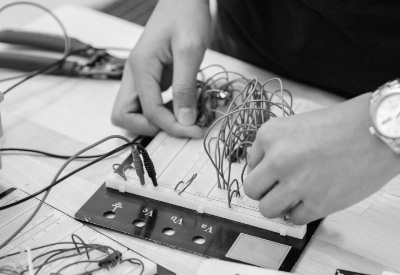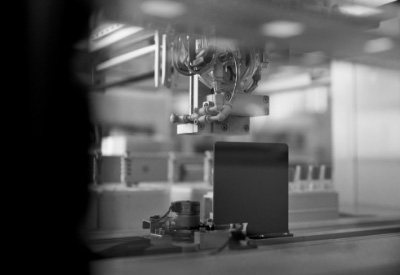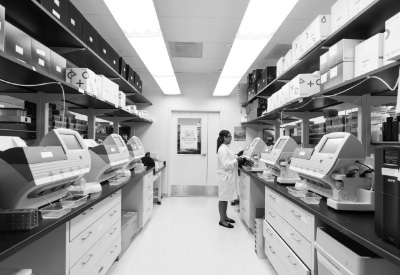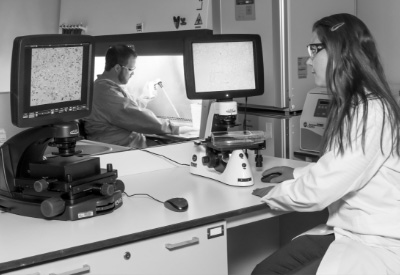
As technology continues to advance, so too has our ability to manufacture improved, smaller, and more efficient electronic devices. These microelectronics are essential components of everyday devices like cell phones and computers, playing a core role in our daily lives.

David Blaauw, the Kensall D. Wise Collegiate Professor of Electrical Engineering and Computer Science at the University of Michigan, is at the forefront of this trend, specializing in designing electronics that push the boundaries of how small they can be. Blaauw is the inventor of the Michigan Micro Mote (M3), a groundbreaking device that holds the title of the world’s smallest computer.

The Problem
When designing the M3, Blaauw encountered a significant challenge common in the microelectronics industry: miniaturizing power sources. Smaller devices typically use smaller batteries, which, due to their size and reliance on traditional battery technology, cannot provide power for extended periods. This posed a challenge in developing long-lifetime applications for the M3, as conventional devices with long lifespans usually depend on larger batteries to sustain their power needs.
The Solution
For Blaauw’s energy needs, City Labs’ nuclear battery technology was the perfect solution, offering over 20 years of reliable and continuous power for microelectronics.
The devices I work with are a perfect marriage for City Labs’ batteries, as we specialize in very low power operations, and City Labs offers batteries that have a long lifetime and are optimized for low-power usage. – David Blaauw
City Labs’ batteries are also much smaller and lighter than conventional batteries, making them an ideal match for the M3 and other devices Blaauw works with. This combination offers the perfect solution for applications where compact size, long lifespan, and continuous operation are beneficial.
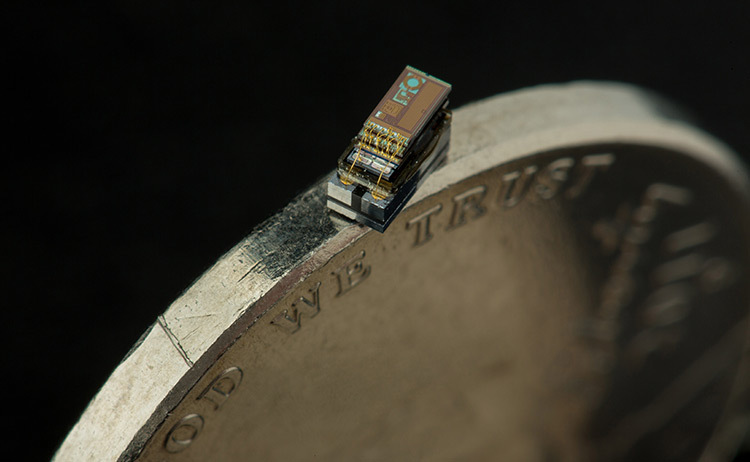
Image: A Michigan Micro Mote sitting atop a nickel. Photo courtesy of David Blaauw.
A Durable and Lasting Microelectronic Power Supply
There are numerous applications where small devices with a long operational lifespan are highly desirable. One area of particular interest for Blaauw and City Labs is the potential use of this technology in downhole applications—such as measuring pressure, temperature, and salinity in oil wells.
The unique design of City Labs’ betavoltaic batteries is particularly suited for this task. Their robust solid-state design can withstand extreme conditions, and their power generation (which relies on the natural decay of tritium) does not depend on temperature-sensitive chemical reactions like most other batteries. This power-generation method also eliminates the need for solar energy, an advantage in environments like oil wells where solar power is unfeasible.
According to Blaauw, current devices designed for downhole drilling typically last only a few days.
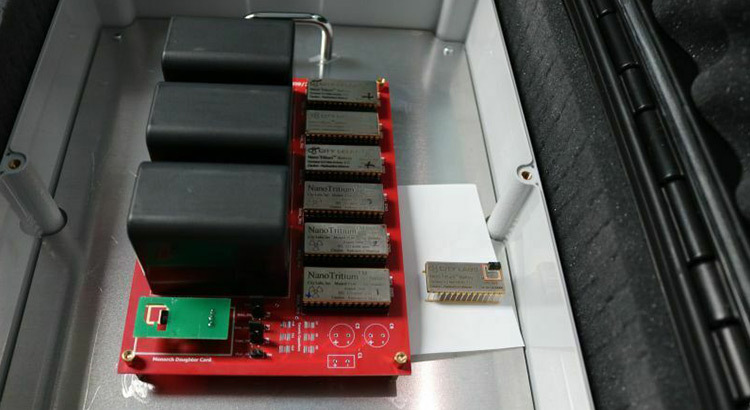
Image: On the Left, the current state-of-the-art board. On the right is a prototype for a NanoTritium™-powered M3.Courtesy of City Labs.
A Bright Future for Micro-Powered Discoveries
Blaauw and City Labs have successfully implemented an initial system powered by NanoTritium™ technology, which has been operational for several years. With this proven prototype, Blaauw believes their ongoing collaboration holds significant potential to transform various key industries. They are now focusing on developing more sophisticated and complex systems, with notable applications including:
Animal & Insect Tracking
Blaauw is exploring the use of M3 devices for tracking purposes and has recently begun a fascinating experiment by equipping monarch butterflies with these devices to monitor their migration patterns. This application has the potential to extend to various small creatures, such as rodents, where tracking could yield valuable scientific and public health insights.
This technology is particularly advantageous for animals and insects that often reside in dark environments where traditional solar energy harvesting is ineffective. In such cases, City Labs’ NanoTritium™ batteries—which utilize internal beta particles—serve a similar function to sunlight in solar-powered devices, enabling continuous energy generation.
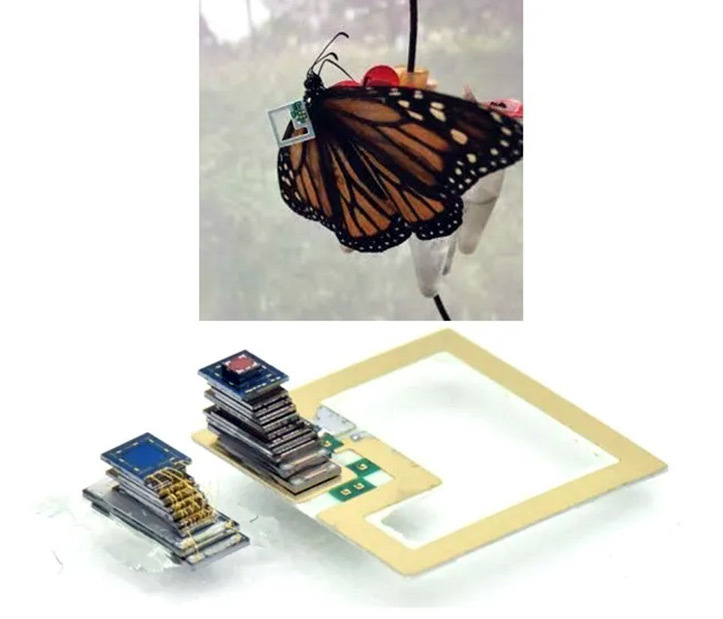
Image: millimeter-tracking sensor and butterfly with attached sensor. Photo courtesy of David Blaauw.
Long-Term Monitoring
Several industries require continuous monitoring of valuable security assets, hazardous materials, and other critical objects in hard-to-access locations. For example, nuclear waste often needs to be monitored for security and temperature, whether it’s buried underground or stored in mountainsides. Similarly, capped oil wells also require ongoing surveillance to ensure their stability after extraction.
Sensing devices powered by NanoTritium™ batteries could continuously monitor these locations for 20+ years without requiring human intervention.
Ocean Measurements
Blaauw and City Labs are also exploring the use of NanoTritium™-powered devices for ocean observation studies. These devices are designed to collect crucial data such as salinity, CO2 levels, and ocean currents—both at the surface and at depth. The gathered information would be transmitted to an orbital satellite, providing valuable insights for understanding ocean conditions, climate change, and more.
Collaborate With City Labs
This ongoing collaboration showcases City Labs’ commitment to partnering with researchers to pioneer new solutions in the low-power energy landscape. City Labs actively collaborates with global experts in both industry and academic settings and is always eager to explore new opportunities.
If you are interested in joining forces with City Labs to drive scientific breakthroughs, we invite you to contact us today.
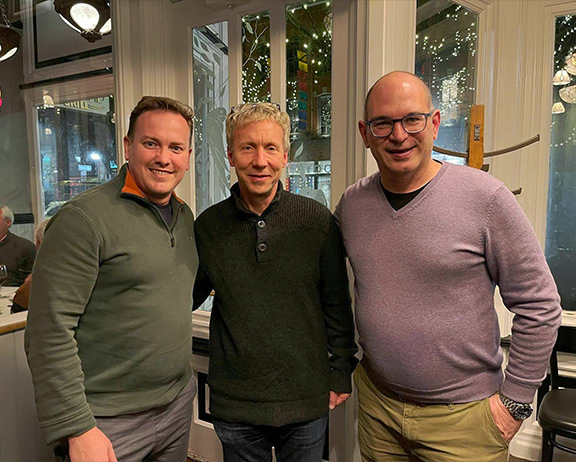
Image: From left to right: Mark Stone, Senior Scientist at City Labs; David Blaauw; Peter Cabauy, CEO of City Labs
The Nuclear Battery Company With a Vision
Ready to power your next innovation or learn more about our technology?
Contact Us Today